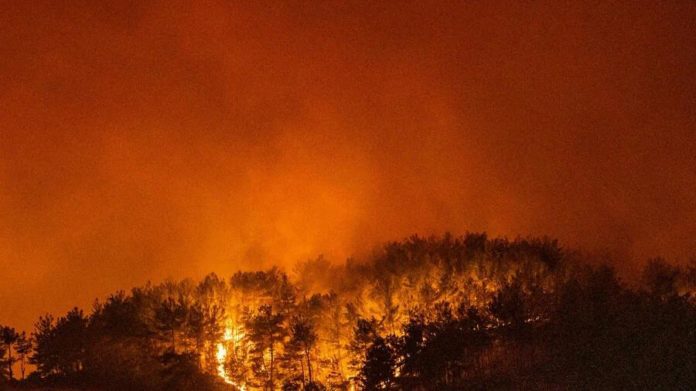“The animals are on fire! Everything is going to burn. Our land, our animals and our house. What else do we have anyway?”
These are the words of Turkish resident Müzeyyen Kaçar about the devastating fires that ravaged Turkey this summer.
On the 28th of July with the Manavgat Fires started in the province of Antalya in the Southwest of the country. By the time that it had been extinguished on the 8th of August, 69,000 hectares (around 84,000 football fields) had been burned. The consequences were horrific for the people in the regions as fifty-nine villages saw their houses, schools, barns, greenhouses, factories and fields turn to mere piles of ashes. Thousands of livestocks and wild animals were lost in the fires, having a devastating effect on the livelihoods of the population. These numbers however are estimates and the actual numbers could be much higher. Unfortunately, eight people (including two firefighters) also perished in the Manavgat Fires. Today the local authorities suspect that these wildfires were started by an arsonist. The culprit has not yet been found, but the police are working on several leads.
The Manavgat Fires are unfortunately not the only wildfires that have devastated Turkey this summer, as there have also been the Muğla Fires located on the Aegean coast. It was composed of nine distinctive fires and began a day after the Manavgat Fires on the 9th of August. In total, 66,300 hectares were burned. While the consequences on the flora and fauna were very similar to the previous fires, there were no human casualties.
During the hasty evacuations of the inhabitants and tourists in these provinces, one question remained: Why did it take so long to get these fires under control? More than just an effect of climate change, these fires tell a story of governmental neglect. Indeed, Erdoğan’s government had been misallocating its resources for years, meaning that they were incompetent to face any kind of wild fire. Despite the fact that Turkey has twenty- three million hectares of forests, the Turkish government does not own any operational firefighting planes as it had been renting three from Russia. This number is shocking especially if compared to Greece, which faced similar wildfires this summer yet were much better equipped with their thirty-nine firefighting planes. To add more fuel to the fire, while the country’s forests burned due to the lack of firefighting planes, President Erdoğan had his own fleet of thirteen planes that were not used. As the fires continued to spread unrelentlessly, the government was forced to seek help from the European Union, Ukraine and Russia. While the fires have now been extinguished, it will take a long time for the people of Antalya and Muğla to regain what they have lost and for the flora and fauna to be restored.
Unfortunately for Turkey, this would not be the only natural catastrophe that it would have to face this summer. Merely two days after the Muğla and Manavgat fires were under control, a flood swept over the province of Kastamonu in the Black Sea region; the deadliest flood that Turkey had seen in the last decade. Officially, seventy-seven people perished. Many experts believe that these types of events (fires and floods) are very likely to become more frequent in the region. This has already been seen this summer, as many countries over the Mediterranean also had to face wildfires. This was the case of the South of France (the French Riviera), Algeria (Tizi Ouzou), Greece and Italy. Belgium and Germany also had to face deadly floods this summer. These recent events once again prove the need for governments to act when it comes to climate change.









